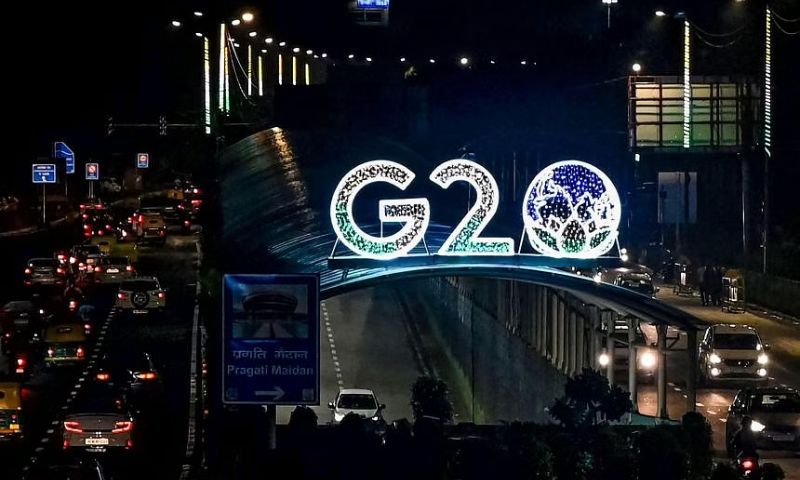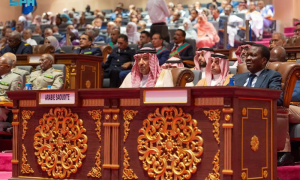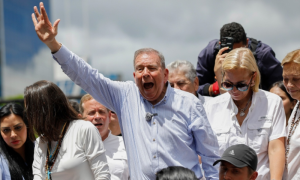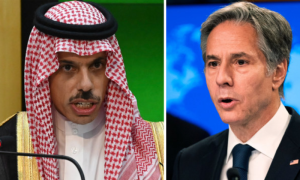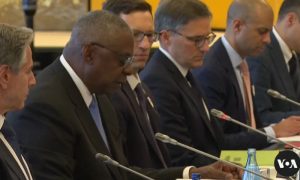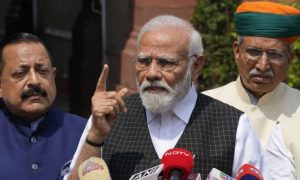NEW DELHI: G20 leaders meet this weekend in the Indian capital New Delhi during what is likely to be the hottest year in human history, but there is little hope that the divided grouping can agree on an ambitious course of action in the event of the crisis.
Geopolitical tensions that have prompted Russian President Vladimir Putin and Chinese leader Xi Jinping to skip talks mean the group is unlikely to reach even a traditional final communique, let alone robust climate commitments.
This is leading to a “potentially catastrophic” failure of countries responsible for 80 per cent of global energy sector emissions, Amnesty International warned on Thursday.
And it could lower expectations ahead of the crucial COP28 climate talks that start in November.
Three key climate issues will be on the table in New Delhi: the push to triple global renewable energy capacity by 2030; weaning economies off fossil fuels – especially coal; and financing the green transition in developing countries.
The build-up to the summit suggests a difficult path to progress on any of them.
G20 ministers avoid to mention coal
In July, G20 energy ministers didn’t even mention coal in their final statement, let alone agree on a phase-down plan, and there was no progress on the renewables target.
“The communication that has come out is woefully inadequate,” UN climate change chief Simon Stiell told AFP this week.
The backdrop to the talks could hardly be starker: the EU’s climate monitor said this week that this year is likely to be the hottest in human history, with UN chief Antonio Guterres declaring: “The climate meltdown has begun”.
“Our climate is imploding faster than we can cope,” he warned.
Evidence of this has been abundant, with devastating floods, record heat and raging wildfires across much of the world in recent months.
The G20 countries account for 85 percent of global GDP and a similar amount of global warming emissions, so action at the forum is critical to real progress.
But per capita coal emissions in the G20 have risen since 2015, research showed this week, despite efforts by some members to transition.
The nine percent increase was largely driven by increases in countries including host India, Indonesia and China.
That dependence on coal, along with geopolitical fault lines over Russia’s invasion of Ukraine and disputes with Beijing, will make a deal to taper difficult.
“At the very least, I hope they will include lines from Bali to phase out coal,” said Madhura Joshi, a senior fellow at climate think tank E3G, referring to last year’s summit, where members pledged to “accelerate efforts” to “phase down undiluted coal power, in line with with national conditions.
Another key issue may be the financing of the energy transition.
Prime Minister Narendra Modi, who has tried to position himself as the voice of the “global South”, insisted ahead of the meeting that climate ambitions “must be aligned with climate finance and technology transfer measures”.
Rich countries have already failed to meet their commitment to provide poorer countries with $100 billion a year in climate finance by 2020.
Amnesty International is urging the developed world to “deliver and substantially increase” this funding, warning of the “potentially catastrophic” consequences of inaction at the G20.
And African nations this week called for $600 billion in renewable energy investment, partly paid for by a global carbon tax.
They also want debt relief and restructuring and the rapid implementation of a “loss and damage” fund for climate-threatened countries.
One bright spot in the talks could be a push for renewables, with draft documents said to include a commitment to aim for a global tripling of capacity by 2030.
“For the first time in history, a global renewable target… is being discussed by world leaders,” Joshi told news agency.
While the specifics of how to achieve that goal still need to be worked out, simply approving the commitment “would be an important step.”









